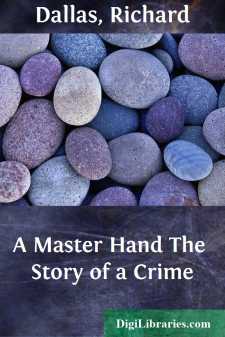Categories
- Antiques & Collectibles 13
- Architecture 36
- Art 48
- Bibles 22
- Biography & Autobiography 813
- Body, Mind & Spirit 142
- Business & Economics 28
- Children's Books 17
- Children's Fiction 14
- Computers 4
- Cooking 94
- Crafts & Hobbies 4
- Drama 346
- Education 46
- Family & Relationships 57
- Fiction 11829
- Games 19
- Gardening 17
- Health & Fitness 34
- History 1377
- House & Home 1
- Humor 147
- Juvenile Fiction 1873
- Juvenile Nonfiction 202
- Language Arts & Disciplines 88
- Law 16
- Literary Collections 686
- Literary Criticism 179
- Mathematics 13
- Medical 41
- Music 40
- Nature 179
- Non-Classifiable 1768
- Performing Arts 7
- Periodicals 1453
- Philosophy 64
- Photography 2
- Poetry 896
- Political Science 203
- Psychology 42
- Reference 154
- Religion 513
- Science 126
- Self-Help 84
- Social Science 81
- Sports & Recreation 34
- Study Aids 3
- Technology & Engineering 59
- Transportation 23
- Travel 463
- True Crime 29
A Master Hand The Story of a Crime
by: Richard Dallas
Description:
Excerpt
A SOLILOQUY
On a Monday evening in January, 1883, I had returned comparatively late from work in the District Attorney's office in New York, and was in my rooms at the Crescent Club on Madison Square, corner of Twenty-sixth Street, making a leisurely toilet for dinner, when a note was brought me from Arthur White. In it he asked me to join a few mutual friends at his rooms on West Nineteenth Street off Fifth Avenue later in the evening for supper. He named the men—Gilbert Littell, Ned Davis, and Oscar Van Bult—who were to join him at euchre before supper. This was a favorite pastime with them, and I was bidden to come early, if I wished, and look on.
I did not play cards myself; not because of any scruples on the subject,—I had knocked about, a bachelor, long enough to take most things in a man's life as they come,—but because I did not care for games of any sort. I was, however, by my friends considered an unobjectionable onlooker—rather a rare reputation to enjoy, I may mention,—probably mine because I did not take sufficient interest in the play to either advise or criticise. It was not unpleasant, however, to sit by in White's attractive quarters and drink and smoke from his excellent sideboard. So having nothing better to do, I sent back word I would come, and getting into my evening clothes, went down to my dinner. It was not often I dined alone, as dinner to me was the occasion of the day and I deemed it incomplete, no matter how excellent the meal, without some congenial companion; but this evening I was later than usual, and so found no one available. Even the habitual acceptors who can always be depended upon in a club to give their society in return for a good dinner had all been engaged.
As I entered the dining-room, I saw my usual table reserved for me and my customary waiter on the outlook.
"You dine alone, sir, to-night?" he asked, as I took my seat, and then having suggested the outline of a light dinner, went off to give the order and bring my usual substitute for a companion, a magazine. To-night, however, I was not in the humor to read, but rather inclined to thoughts of the men brought to mind by White's invitation.
They were all intimate friends, and it is as well I should tell something about them here as another time, for they are destined to play more or less conspicuous parts in the miserable affair which is the occasion of this book.
To begin with my host—Arthur White was an attractive, lovable fellow when in his brighter moods, but weak and variable. A man of good impulses, I think, but so fond of luxury and idleness that he was often selfish in his self-indulgence; of that sort of men that other men feel something akin to affection for, such as for a younger brother or a woman, so easily led and dependent do they seem. He was still young, not yet out of his twenties, and, living in extravagant idleness and dissipation, was spending pretty rapidly a bequest of a hundred thousand dollars he had inherited, about two years before, from an uncle....


